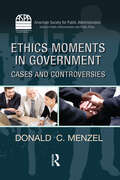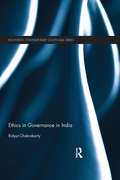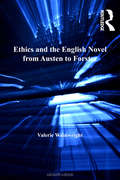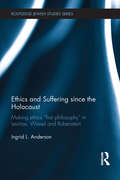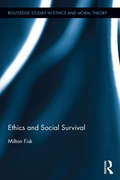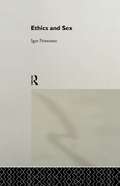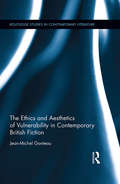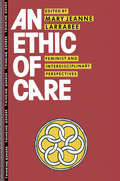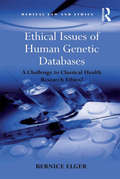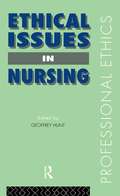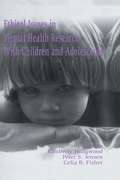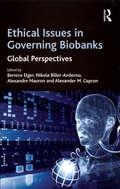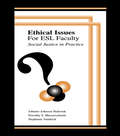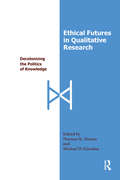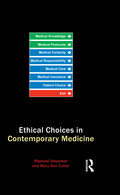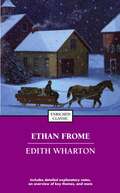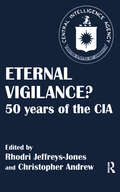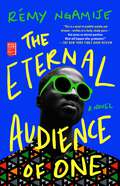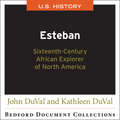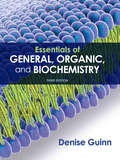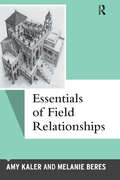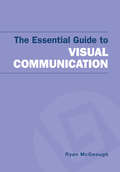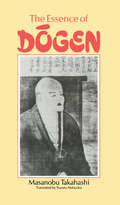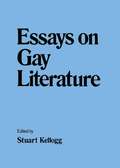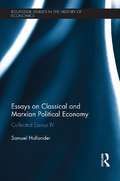Special Collections
Benetech’s Global Certified Accessible Titles
Description: Benetech’s GCA program is the first independent third-party EPUB certification to verify ebook accessibility. By creating content that is born accessible, publishers can meet the needs of all readers. Learn more: https://bornaccessible.benetech.org/
- Table View
- List View
Ethics Moments in Government
by Donald C. MenzelEthical concerns are among the most common problems public administrators face, yet the issues are often complex, and the correct choices are not always clear. Living up to the public trust is much more than just an act of compliance. It also involves perceiving, preventing, avoiding, and resolving accusations of illegal or unethical behavior, including appearances of inappropriate behavior. Ethics Moments in Government: Cases and Controversies examines how to identify, assess, and resolve the ethical issues and dilemmas that often confront those who govern the cities, counties, states, and federal agencies throughout America. Real Situations, Real Advice Providing a one-stop resource for all those who must contend with thorny ethical issues, this volume presents case studies that vary in complexity and context and are based on real situations. Each case scenario is followed by discussion questions and case assessments by expert practitioners who describe how they would handle the situation. Using a "total immersion" technique, the book encourages readers to be reflexive and analytical in addressing the problems presented and arriving at appropriate solutions. A supplemental CD is included which contains PowerPoint® slide presentations, articles, workshop programs, tests, and links to organizations. For many of the scenarios presented in this volume, there are no easy answers. Practical guidance on reasoning through difficult decision-making situations enables public administrators to acquire the ethical knowledge, skills, abilities, and instincts that will ultimately help them gain the trust of their citizens and advance in their careers.
Ethics in Governance in India
by Bidyut ChakrabartyGovernance and ethics are intertwined. A government functions within certain broad moral and ethical parameters, integrally linked with the sociological foundation of the polity in which it is articulated. The importance of ethics in governance has acquired a significant place in contemporary theoretical discussion. This book situates ethics in governance in India in the national frame and incorporates the context of globalization, allowing for the increasing importance of non-state global actors in national decision making. The author argues that a lack of ethics quickly turns into corruption and leads to governmental efforts to deal with it. He proposes that ethics are a set of standards that a society places on itself to articulate its responses to societal needs, and discusses the efforts of the Indian government at eradicating corruption and its failure. A theoretical approach to the issues of ethics in governance and corruption, this book is of interest to academics in the fields of Asian Politics, in particular Indian politics, and political philosophy.
Ethics and the English Novel from Austen to Forster
by Valerie WainwrightComplicating a pervasive view of the ethical thought of the Victorians and their close relations, which emphasizes the domineering influence of a righteous and repressive morality, Wainwright discerns a new orientation towards an expansive ethics of flourishing or living well in Austen, Gaskell, Dickens, Eliot, Hardy and Forster. In a sequence of remarkable novels by these authors, Wainwright traces an ethical perspective that privileges styles of life that are worthy and fulfilling, admirable and rewarding. Presenting new research into the ethical debates in which these authors participated, this rigorous and energetic work reveals the ways in which ideas of major theorists such as Kant, F. H. Bradley, or John Stuart Mill, as well as those of now little-known writers such as the priest Edward Tagart, the preacher William Maccall, and philanthropist Helen Dendy Bosanquet, were appropriated and reappraised. Further, Wainwright seeks also to place these novelists within the wider context of modernity and proposes that their responses can be linked to the on-going and animated discussions that characterize modern moral philosophy.
Ethics and Suffering since the Holocaust
by Ingrid L AndersonFor many, the Holocaust made thinking about ethics in traditional ways impossible. It called into question the predominance of speculative ontology in Western thought, and left many arguing that Western political, cultural and philosophical inattention to universal ethics were both a cause and an effect of European civilization's collapse in the twentieth century. Emmanuel Levinas, Elie Wiesel and Richard Rubenstein respond to this problem by insisting that ethics must be Western thought's first concern. Unlike previous thinkers, they locate humanity's source of universal ethical obligation in the temporal world of experience, where human suffering, rather than metaphysics, provides the ground for ethical engagement. All three thinkers contend that Judaism’s key lesson is that our fellow human is our responsibility, and use Judaism to develop a contemporary ethics that could operate with or without God. Ethics and Suffering since the Holocaust explores selected works of Levinas, Wiesel, and Rubenstein for practical applications of their ethics, analyzing the role of suffering and examining the use each thinker makes of Jewish sources and the advantages and disadvantages of this use. Finally, it suggests how the work of Jewish thinkers living in the wake of the Holocaust can be of unique value to those interested in the problem of ethics in the twentieth and twenty-first centuries. Presenting a thorough investigation of the work of Levinas, Wiesel and Rubinstein, this book is of key interest to students and scholars of Jewish studies, as well as Jewish ethics and philosophy.
Ethics and Social Survival
by Milton FiskWhen speaking of society’s role in ethics, one tends to think of society as regimenting people through its customs. Ethics and Social Survival rejects theories that treat ethics as having justification within itself and contends that ethics can have a grip on humans only if it serves their deep-seated need to live together. It takes a social-survival view of ethical life and its norms by arguing that ethics looks to society not for regimentation by customs, but rather for the viability of society. Fisk traces this theme through the work of various philosophers and builds a consideration of social divisions to show how rationalists fail to realize their aim of justifying ethical norms across divisions. The book also explores the relation of power and authority to ethics—without simply dismissing them as impediments—and explains how personal values such as honesty, modesty, and self-esteem still retain ethical importance. Finally, it shows that basing ethics on avoiding social collapse helps support familiar norms of liberty, justice, and democracy, and strives to connect global and local ethics.
Ethics and Sex
by Igor PrimoratzEthics and Sex presents a systematic study of the nature and moral significance of human sexuality and of the major issues in sexual morality.The book is divided into two main parts. Part One gives a critical analysis of the key conceptions of human sexuality. Part Two discusses the most important issues in sexual morality: monogamy; adultery; prostitution; homosexuality; paedophilia; sexual harassment and rape.In this controversial and accessible book, the author demonstrates that many of the prohibitions that make up conventional sexual morality cannot withstand critical scrutiny.
The Ethics and Aesthetics of Vulnerability in Contemporary British Fiction
by Jean-Michel GanteauThis book visits vulnerability in contemporary British fiction, considering vulnerability in its relation to poetics, politics, ethics, and trauma. Vulnerability and risk have become central issues in contemporary culture, and artistic productions have increasingly made it their responsibility to evoke various types of vulnerabilities, from individual fragilities to economic and political forms of precariousness and dispossession. Informed by trauma studies and the ethics of literature, this book addresses such issues by focusing on the literary evocations of vulnerability and analyzing various aspects of vulnerable form as represented and performed in British narratives, from contemporary classics by Peter Ackroyd, Pat Barker, Anne Enright, Ian McEwan, and Jeanette Winterson, to less canonical texts by Nina Allan, Jon McGregor, and N. Royle. Chapters on romance, elegy, the ghost story, and the state-of-the-nation novel draw on a variety of theoretical approaches from the fields of trauma studies, affect theory, the ethics of alterity, the ethics of care, and the ethics of vulnerability, among others. Showcasing how the contemporary novel is the privileged site of the expression and performance of vulnerability and vulnerable form, the volume broaches a poetics of vulnerability based on categories such as testimony, loss, unknowing, temporal disarray, and performance. On top of providing a book-length evocation of contemporary fictions of vulnerability and vulnerable form, this volume contributes significantly to considerations of the importance of Trauma Studies to Contemporary Literature.
An Ethic of Care
by Mary Jeanne LarrabeePublished in 1982, Carol Gilligan's In a Different Voice proposed a new model of moral reasoning based on care, arguing that it better described the moral life of women. An Ethic of Care is the first volume to bring together key contributions to the extensive debate engaging Gilligan's work. It provides the highlights of the often impassioned discussion of the ethic of care, drawing on the literature of the wide range of disciplines that have entered into the debate. Contributors: Annette Baier, Diana Baumrind, Lawrence A. Blum, Mary Brabeck, John Broughton, Owen Flanagan, Marilyn Friedman, Carol Gilligan, Catherine G. Greeno, Catherine Jackson, Linda K. Kerber, Mary Jeanne Larrabee, Zella Luria, Eleanor E. Maccoby, Linda Nicholson, Bill Puka, Carol B. Stack, Joan C. Tronto, Lawrence Walker, Gertrud Nunner-Winkler.
Ethical Issues of Human Genetic Databases
by Bernice ElgerFollowing the boom in population databases in recent years there has been sustained and intense international debate about political processes and legal and ethical issues surrounding the protection and use of genetic data. As a result, several national and international organizations and committees have published widely differing guidelines and statements concerning genetic databases and biobanks. Ethical Issues of Human Genetic Databases compares the new area of biobanking with the tradition of ethically accepted classical research and highlights the distinctive features of existing databases and guidelines. The volume identifies areas of consensus and controversy while investigating the challenges posed to classical health research ethics by the existence of genetic databases, analyzing the reasons for such varying guidelines. The book will be essential to academics, biobankers, policy-makers and researchers in the field of medical ethics.
Ethical Issues in Nursing
by Geoffrey Hunt and Dr Geoffrey HuntThis is the first book to take nursing ethics beyond stock 'moral concepts' to a critical examination of the fundamental assumptions underlying the very nature of nursing. It takes as its point of departure the difficulties nurses experience practising within the confines of a bioethical model of health and illness and a hierarchical, technocratic health care system. The contributors go on to deal openly and honestly with controversial issues faced by nurses, such as euthanasia and HIV.
Ethical Issues in Mental Health Research With Children and Adolescents
by Peter S. Jensen and Celia B. Fisher and Kimberly HoagwoodStudies involving children with mental, emotional, or behavioral problems--or their families--have to meet certain standards of research ethics. This book contains chapters on the kinds of ethical dilemmas that typically occur in different types of studies of children, and then presents 65 real-world cases from experts who study children's mental health. These experts offer practical suggestions for how to handle these dilemmas. Chapters on the perspectives of parents, regulators, and bioethicists provide additional points of view on these issues. Written in down-to-earth language, this book will be useful for professionals who study children, for those who train students in research methods, and for parents who are thinking about participating in research studies. In attempting to bridge the apparent gap between ethics and science, the editors close this volume on a note commonly sounded by researchers: more research is needed. Yet in this area, a new kind of research is required. The science of scientific ethics must be developed and expanded, and better understanding of the determinants and circumstances under which children can comprehend and evaluate risks and benefits is needed. Likewise, fuller knowledge of the contextual factors affecting children's and families' consent to participate in research is essential. In particular, development of scales to assess children's ability to comprehend risk-benefit issues, studies of families' reactions to research procedures, and empirical data on the impact of various forms of participant reimbursement will advance both science and ethics. This volume should spur further research, serving as a guide for current investigators, participating families, institutional review boards, and policymakers who shape the research enterprise.
Ethical Issues in Governing Biobanks
by Nikola Biller-Andorno and Alexander M. CapronPopulation genomics research drawing on genetic databases has expanded rapidly, with some of this information being combined in 'biobanks'. Managing this information in an appropriate way is a highly complex ethical issue in the health policy arena. This book combines theoretical and empirical research to analyze the areas of conflict and consensus in the regulatory and ethical frameworks that have been developed to govern biobanks. Ethicists from the Department of Ethics, Trade, Human Rights and Health Law (ETH) of the World Health Organization, the Institute of Biomedical Ethics of Geneva University and the Institute of Biomedical Ethics of the University of Zurich, with the support of the Geneva International Academic Network (GIAN), examine the conditions under which genetic databases can be established, kept, and made use of in an ethically acceptable way. In addition to a comprehensive review of the scientific literature and a comparative analysis of existing normative frameworks, they present the results of in-depth interviews with experts around the world concerning the most unresolved and controversial issues. The results of that study, combined with their normative analysis, leads to recommendations for a better international framework.
Ethical Issues for Esl Faculty
by Johnnie Johnson Hafernik and Stephanie Vandrick and Dorothy S. MesserschmittThis book explicitly addresses ethical dilemmas and issues that post-secondary ESL faculty commonly encounter and examines them in the framework of social justice concerns. Ethics is defined broadly, to include responsibilities and obligations to students inside and outside the classroom, as well to colleagues, educational institutions, the TESL profession, and society as a whole. Scenarios in each chapter provide realistic and compelling situations for reflection and discussion. The authors then set out the issues raised, relate them to the classroom environment, and offer opportunities to examine them in a variety of contexts and to consider possible solutions to the dilemmas. Issues include testing, plagiarism, technology, social and political issues affecting students and the classroom, gift-giving, curriculum decisions, disruptive students, institutional constraints, academic freedom, gender, class, and power. Busy classroom instructors will find this book accessible, thought-provoking, and relevant to their daily work situations. It is not intended as a theoretical treatment of ethics and social justice in ESL, nor does it propose that ESL faculty teach morals or ethics to students. Rather, it is designed as a concise, practical introduction to ethical practice for both new and experienced ESL faculty in post-secondary teaching situations in the United States, for others interested in the ESL classroom, and as a text for TESL classes and seminars. Ethical Issues for ESL Faculty: *maps new territory in the field--ethical issues in TESL, particularly as encountered by post-secondary classroom teachers, are not often discussed in ESL publications; *makes the complex issues of ethics in the context of social justice accessible to TESL practitioners; and *includes useful resources, such as additional scenarios for discussion, an extensive reference list, and selected ethics-related Web sites.
Ethical Futures in Qualitative Research
by Norman K. Denzin and Michael D. GiardinaEthics has been a perennial concern of qualitative researchers. The subject has been confounded with the emergence of human subjects regulations, the increased concern with indigenous communities, the globalization of research practices, and the breakdown of barriers between researcher and subject. The original contributions to this volume highlight the key topics that face contemporary qualitative researchers and those that will likely emerge in the near future. Written by many of the leading figures in the field—Lincoln, Denzin, Schwandt, Richardson, Ellis, Bochner, Morse, among others—this book will help shape the ethical response of the field to the challenges presented by the contemporary research environment.
Ethical Choices in Contemporary Medicine
by Raphael Sassower and Mary Ann Gardell Cutter"Ethical Choices in Contemporary Medicine" jettisons the standard medical ethics models of "rights" language and shows how the bioethical problems that receive attention from the media and the public are related to and are explicable in terms of the epistemological foundations of science and medicine. These epistemological concerns include how medical knowledge is established (scientific validity), how medical protocols are administered (checks and balances), how medical certainty is evaluated (probability) and medical responsibility is framed (personal or collective), and how medical knowledge is transmitted (popular media versus professional journals) and how medical care is allocated (insurance policies and government subsides). The book examines the present predicaments of medicine within a broad cultural context and suggests that rational discourse and parochial ethical dialogue may be futile in the face of competing and incommensurable frameworks and agendas, attitudes and wishes. The authors show that, in the postmodern age, two interrelated issues surface when it comes to medicine. On the one hand, there is a strong critique of science and the privileges associated with the scientific discourse and, on the other, there is still a deep-seated quest for certainty in all medical matters.
Ethan Frome
by Edith WhartonEnriched Classics offer readers accessible editions of great works of literature enhanced by helpful notes and commentary. Each book includes educational tools alongside the text, enabling students and readers alike to gain a deeper and more developed understanding of the writer and their work.An entrancing but sad story of a poverty-stricken Massachusetts farmer caught in a loveless marriage. The main characters are Ethan Frome, his wife Zenobia, called Zeena, and her young cousin Mattie Silver. Frome and Zeena marry after she nurses his mother in her last illness. Although Frome seems ambitious and intelligent, Zeena holds him back. When her young cousin Mattie comes to stay on their New England farm, Frome falls in love with her. But the social conventions of the day doom their love and their hopes. Ethan’s love for his young cousin leads to one day of explosive emotions with tragic consequences. The story forcefully conveys Wharton’s abhorrence of society’s unbending standards of loyalty. Enriched Classics enhance your engagement by introducing and explaining the historical and cultural significance of the work, the author’s personal history, and what impact this book had on subsequent scholarship. Each book includes discussion questions that help clarify and reinforce major themes and reading recommendations for further research. Read with confidence.
Eternal Vigilance?
by Christopher Andrew and Rhodri Jeffreys-JonesEternal Vigilance? seeks to offer reinterpretations of some of the major established themes in CIA history such as its origins, foundations, its treatment of the Soviet threat, the Iranian revolution and the accountability of the agency. The book also opens new areas of research such as foreign liaison, relations with the scientific community, use of scientific and technical research and economic intelligence. The articles are both by well-known scholars in the field and young researchers at the beginning of their academic careers. Contributors come almost equally from both sides of the Atlantic. All draw, to varying degrees, on recently declassified documents and newly-available archives and, as the final chapter seeks to show, all point the way to future research.
The Eternal Audience of One
by Rémy Ngamije&“The Eternal Audience of One is laugh-out-loud funny with writing that is sometimes so beautiful that it dances off the page—to a millennial beat—in perfect tempo with its tales of migration, love, loss, and friendship.&” —Sarah Ladipo Manyika, author of In Dependence Reminiscent of Zadie Smith and Michael Chabon, this &“gorgeous, wildly funny, and, above all, profoundly moving and humane&” (Peter Orner, author of Am I Alone Here) coming-of-age tale follows a young man who is forced to flee his homeland of Rwanda during the Civil War and make sense of his reality.Nobody ever makes it to the start of a story, not even the people in it. The most one can do is make some sort of start and then work toward some kind of ending. One might as well start with Séraphin: playlist-maker, nerd-jock hybrid, self-appointed merchant of cool, Rwandan, stifled and living in Windhoek, Namibia. Soon he will leave the confines of his family life for the cosmopolitan city of Cape Town, in South Africa, where loyal friends, hormone-saturated parties, adventurous conquests, and race controversies await. More than that, his long-awaited final year in law school promises to deliver a crucial puzzle piece of the Great Plan immigrant: a degree from a prestigious university. But a year is more than the sum of its parts, and en route to the future, the present must be lived through and even the past must be survived. From one of Africa&’s emerging literary voices comes a lyrical and piquant tale of family, migration, friendship, war, identity, and race following the intersecting lives of Séraphin and a host of eclectic characters from pre- and post-1994 Rwanda, colonial and post-independence Windhoek, Paris and Brussels in the 70s, Nairobi public schools, and the racially charged streets of Cape Town.
Esteban: Sixteenth-Century African Explorer of North America
by Kathleen DuVal and John DuValThe documents in this collection introduce the story of Esteban, one of the first people of African descent to visit what today is the United States. Students will engage with a wide range of primary sources, constructing an argument based on the central question: What do descriptions of Esteban�s explorations tell us about slavery, race, and first encounters in sixteenth-century North America? Given the limited nature of these sources, what can we never know? Students are guided in their analyses of the documents by a learning objective, central question, historical background, source headnotes, source questions, project questions and suggestions for further research. Through their work with these sources, they will gain a deeper awareness of the diversity of the American experience, a more complete understanding of the present in an historically-based context, an enhanced ability to read, interpret, assess, and contextualize primary sources, and practice explaining historical change over time.
Essentials of General, Organic, and Biochemistry
by Denise GuinnThe essential chemistry for health careers and everyday life. Guinn’s Essentials of General, Organic and Biochemistry 3e uses health and medicine as the framework for learning the fundamentals of chemistry. Focusing on core concepts and necessary math skills, the easily digestible content and medical applications help reduce student anxiety and make chemistry meaningful for students preparing for future careers in nursing and other allied health professions. Paired with SaplingPlus and an embedded eBook, students will be able to focus their study with adaptive quizzing and understand the relevance of chemistry through videos, animations and case studies.
Essentials of Field Relationships
by Amy Kaler and Melanie BeresField research can consist of trekking across the globe to study peoples in exotic cultural settings. It can also mean strapping on your running shoes and observing behavior at the local market. Regardless of whether the researcher is “at home” or away, the development of research relationships is paramount to the success of the research project. In this book, the authors provide guidance to researchers on developing relationships in their field research. Using a myriad of examples from projects in a wide range of settings, Kaler and Beres offer helpful hints about how to navigate the personal side of conducting research—establishing and maintaining relationships, handling ethical dilemmas, and identifying how the personal identity of researchers help shape their projects.
The Essential Guide to Visual Communication
by Ryan McGeoughThe Essential Guide to Visual Communication
Essence Of Dogen
by TakahashiFirst published in 1983. Routledge is an imprint of Taylor & Francis, an informa company.
Essays on Gay Literature
by Stuart KelloggAn important contribution to the rapidly growing field of gay literary criticism and scholarship, this volume contains well-written and intelligently argued essays on the the homosexual tradition in Western literature. The first book of its kind, Essays on Gay Literature investigates the ways in which homosexuality has been viewed by a variety of authors from the Middle Ages to the present, including William Shakespeare, Christopher Marlowe, E. M. Forster, James Merrill, Henry James, and William Faulkner.
Essays on Classical and Marxian Political Economy
by Samuel HollanderSamuel Hollander’s work has been provoking debate for over four decades. This book brings together key contributions of recent years, in addition to some brand new pieces. The essays are introduced by a Preface in which Hollander reflects on his past work and reactions to it. Highlights include two issues of particular current relevance. Conspicuous is an extensive chapter regarding Adam Smith’s often neglected arguments for government intervention in the economy to correct market failures, and his critical view of the business class as an anti-social force. Important economists considered in relation to Adam Smith’s position on the role of the state include Jeremy Bentham and the Scottish-Canadian John Rae. Similarly of high present-day interest is a re-examination of Karl Marx’s theory of exploitation, or the notion of profits as "embezzlement," demonstrating Marx’s effective abandonment of this perspective in the case of the small active businessman as distinct from the major joint-stock corporation. Other papers demonstrate the close intellectual relationship between David Ricardo and Thomas Robert Malthus; the extensive common ground between the British school and the French under the leadership of Jean-Baptiste Say; the failure of a so-called anti-Ricardian opposition in Britain represented by Samuel Bailey; and the denial of a sharp discontinuity between "classical" and later "neo-classical" economics. Finally, several biographical essays are included as well as an extension of the autobiographical account appearing in Collected Essays II.
